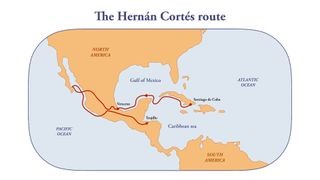Hernán Cortés, a name synonymous with both conquest and controversy, played a pivotal role in Spanish exploration during the Age of Exploration. His audacious expedition to Mexico in the early 16th century led to the fall of the Aztec Empire and dramatically expanded Spain’s colonial reach. While his methods were often brutal, his impact on Spanish exploration and the course of history remains undeniable. This article delves into the reasons why Cortés holds such a significant position in the narrative of Spanish exploration.
Cortés’s Conquest: A Turning Point for Spain
Cortés’s importance to Spanish exploration stems primarily from his successful conquest of the Aztec Empire in 1521. This victory not only brought immense wealth to Spain in the form of gold and other resources but also opened up vast territories for colonization. Prior to Cortés, Spanish exploration in the Americas had largely focused on the Caribbean islands and the coastlines of South and Central America. Cortés’s bold move into the interior of Mexico demonstrated the potential for further expansion and spurred subsequent expeditions deeper into the continent.
Beyond Gold: Expanding the Spanish Empire
While the lure of gold was a significant motivator, Cortés’s expedition also served the broader goal of expanding the Spanish Empire. The acquisition of new territories brought prestige and power to Spain, solidifying its position as a dominant force in Europe. Cortés’s success paved the way for the establishment of New Spain, a vast colonial territory encompassing much of modern-day Mexico, Central America, and parts of the United States. This expansion significantly reshaped the political and cultural landscape of the Americas.
Map illustrating Cortés’s route through Central America. His expedition started in Cuba and culminated in the conquest of the Aztec capital, Tenochtitlán.
A Catalyst for Further Exploration
Cortés’s conquest of Mexico had a ripple effect, inspiring further Spanish exploration and conquest. His exploits demonstrated that seemingly powerful indigenous empires could be overthrown, encouraging other conquistadors to seek their own fortunes and glory in the Americas. The fall of the Aztecs led to expeditions northward into what is now the southwestern United States and southward into South America, ultimately contributing to the establishment of a vast Spanish colonial empire.
Cultural Transformation and its Consequences
Cortés’s arrival in Mexico also marked a significant cultural transformation. The introduction of European diseases, such as smallpox, devastated the indigenous population, weakening their resistance to Spanish rule. Cortés actively sought to convert the indigenous people to Christianity, suppressing native religions and traditions. The imposition of Spanish language, culture, and religion had a profound and lasting impact on the indigenous populations of Mexico. The blending of indigenous and European cultures resulted in the mestizo population, a defining characteristic of modern Mexican society.
A statue of Hernán Cortés in his birthplace, Medellín, Spain. This monument reflects the complex legacy of Cortés as both a national hero and a symbol of colonial brutality.
A Complex and Controversial Legacy
While Cortés’s contributions to Spanish exploration are undeniable, his legacy remains deeply controversial. His conquest was achieved through violence, exploitation, and the destruction of indigenous cultures. The brutality of his methods and the devastating impact of Spanish colonization on indigenous populations continue to be debated and condemned.
Conclusion: A Pivotal Figure in Spanish Exploration
Hernán Cortés stands as a pivotal figure in Spanish exploration. His conquest of the Aztec Empire dramatically expanded Spain’s colonial empire, fueled further exploration, and irrevocably altered the cultural landscape of the Americas. While his actions were often ruthless, his impact on history is undeniable, solidifying his place as a key figure in the Age of Exploration. His story serves as a reminder of the complex and often brutal nature of colonial expansion.
